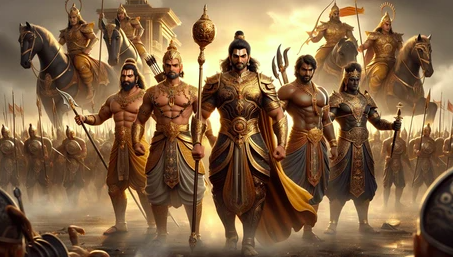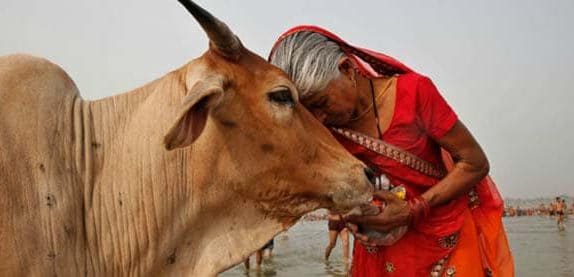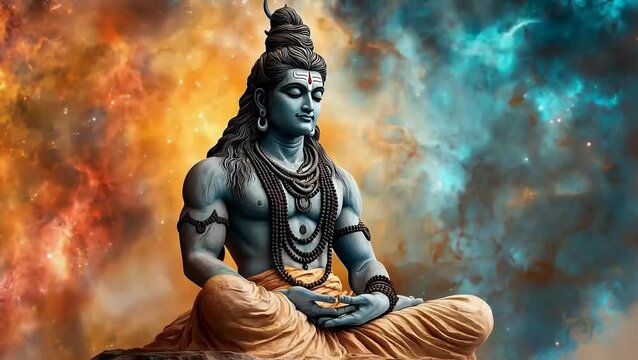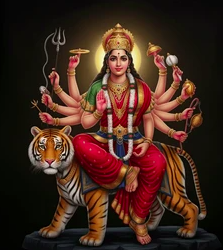
Beyond the Battlefield: The Untold Journey of the Pandavas After the Mahabharata War
Blog
What happened to the Pandavas after the great war of Kurukshetra? Their story didn’t end with victory — it transformed into a spiritual quest toward redemption, detachment, and ultimate liberation. Discover the lesser-known final journey of the Pandavas in this soul-stirring retelling.
1791
Shivam Gangwar
8 min
Apr 21, 2025
🌺 Where Did the Pandavas Go After the Kurukshetra War?
The Untold Journey of the Pandavas After Victory in Mahabharata
The Mahabharata, one of the greatest epics in Indian history, culminates with the catastrophic Kurukshetra war. With the Kauravas defeated, the Pandavas emerge victorious. However, the end of the war doesn't mark the end of their story. In fact, what follows is a profound and deeply philosophical journey — one of rule, renunciation, and realization.
So, what happened to the Pandavas after the Kurukshetra war? Where did they go? Let's explore their journey after the battlefield was left behind and silence took the place of war cries.
👑 The Reign of Yudhishthira: The Era of Dharma
After the war, Yudhishthira was crowned the king of Hastinapura. However, this victory came at a great cost — the death of family, friends, teachers, and allies. The destruction haunted him so deeply that he initially refused to take the throne.
Only after guidance from Lord Krishna and the sages, did Yudhishthira agree to ascend the throne, fulfilling his dharma. The Pandavas ruled wisely and fairly, bringing peace and prosperity to the kingdom. This era is known as Yudhishthira’s golden rule.
🔥 The Aftermath of the War: Guilt and Grief
Despite the external peace, the inner lives of the Pandavas were tormented. They carried the heavy burden of having caused the deaths of many, including:
- Bhishma Pitamah
- Guru Dronacharya
- Karna (their own brother)
- The Kauravas (their cousins)
Yudhishthira, in particular, was consumed by guilt. Even the grand Ashwamedha Yajna performed by him didn’t wash away their inner sorrow. The death of Lord Krishna later became a turning point that convinced them their purpose had been fulfilled.
🚶♂️ The Great Departure – Mahaprasthanika Parva
After ruling for 36 years, the Pandavas decided to renounce the throne and embark on their final journey to the Himalayas, seeking liberation (moksha). This journey is described in the Mahabharata’s Mahaprasthanika Parva, which means “The Book of the Great Journey.”
The Pandavas handed over the kingdom to Parikshit, Arjuna’s grandson (son of Abhimanyu), and set off on foot towards the Himalayas along with Draupadi.
🏔️ The Journey Towards Heaven – Symbolic and Spiritual
Clad in simple clothes, barefoot, and without weapons, the Pandavas started walking towards the Himalayas. Their path represented the final renunciation of worldly life.
On this journey, one by one, they fell:
- Draupadi – the first to fall, for having loved Arjuna the most out of the five.
- Sahadeva – for his pride in wisdom.
- Nakula – for his pride in his looks.
- Arjuna – for his ego about his archery skills.
- Bhima – for his gluttony and pride in strength.
Only Yudhishthira remained.
🐕 The Mysterious Dog and the Final Test
Throughout the journey, a dog accompanied Yudhishthira. When he reached the gates of heaven (Swargaloka), Lord Indra appeared in his chariot and invited him in. However, Indra told him the dog couldn’t enter.
Yudhishthira refused to enter heaven without the dog, showcasing his ultimate compassion and adherence to dharma. This was his final test. The dog then transformed into Dharma himself — Yudhishthira’s divine father, and he was declared victorious in all aspects of righteousness.
🕊️ Entry into Heaven
Yudhishthira, alive and pure, was taken to heaven in his mortal body — a reward for his lifelong adherence to truth and dharma. In heaven, he saw the souls of his brothers and Draupadi, now free from sins and united in bliss.
✨ The Symbolism Behind the Journey
The Mahaprasthan (Great Departure) is not just a literal story, but a deeply symbolic one. Each fall represents human flaws and how even the noblest heroes are not free from them. Only Yudhishthira, the embodiment of truth and righteousness, attains heaven without facing punishment in hell.
The story teaches that moksha (liberation) is the highest goal, achievable only through truth, detachment, and sacrifice.
📚 Legacy of the Pandavas
Even today, the Pandavas are remembered not just as warriors but as spiritual seekers. Their journey from battlefield to the Himalayas is a journey from karma to moksha, from victory to renunciation, from dharma to eternal peace.
🧘 Final Words
The journey of the Pandavas after the war reminds us that true victory lies not in defeating others, but in overcoming ourselves. The Mahabharata doesn’t just end with war — it ends with wisdom.
Let their story inspire us to walk the path of truth, compassion, and detachment.
🌺 कुरुक्षेत्र युद्ध के बाद पांडव कहाँ गए?
महाभारत की एक अनकही यात्रा – युद्ध के बाद पांडवों की कहानी
महाभारत भारत के इतिहास का एक महान ग्रंथ है, जिसकी पराकाष्ठा होती है विनाशकारी कुरुक्षेत्र युद्ध में। जब कौरवों की पराजय होती है, तब पांडव विजयी होते हैं। लेकिन यह विजय उनके जीवन की समाप्ति नहीं होती — बल्कि यह शुरुआत होती है एक गहरे, अध्यात्मिक और दर्शन से भरी यात्रा की।
तो सवाल उठता है —
महाभारत के युद्ध के बाद पांडव कहाँ गए?
चलिए जानते हैं उनके उस सफर के बारे में जो युद्ध के मैदान के बाद शुरू हुआ।
👑 युधिष्ठिर का राज्याभिषेक – धर्मराज का युग
युद्ध के पश्चात युधिष्ठिर को हस्तिनापुर का राजा बनाया गया। लेकिन यह जीत उन्हें अत्यंत भारी पड़ी। उनके अपने परिवार, गुरु, मित्र और संबंधियों की मृत्यु ने उन्हें भीतर से तोड़ दिया था।
उन्होंने पहले तो राजगद्दी ठुकरा दी, परन्तु भगवान श्रीकृष्ण और ऋषियों की सलाह पर उन्होंने अपना धर्म निभाया और सिंहासन स्वीकार किया। उनके राज्यकाल को धर्म का स्वर्ण युग कहा जाता है।
🔥 युद्ध के बाद का पश्चाताप और पीड़ा
युद्ध जीतने के बाद भी पांडवों को चैन नहीं मिला। उनके हाथों:
- भीष्म पितामह
- गुरु द्रोणाचार्य
- कर्ण (जो उनके भाई थे)
- सौ से अधिक कौरव (जो उनके भाई थे)
की मृत्यु हुई थी।
युधिष्ठिर के मन में गहरा अपराधबोध था। उन्होंने अश्वमेध यज्ञ किया, लेकिन उनके हृदय की पीड़ा शांत नहीं हुई।
जब श्रीकृष्ण का देहांत हुआ, तब उन्होंने समझ लिया कि अब उनका जीवन उद्देश्य पूर्ण हो चुका है।
🚶♂️ महाप्रस्थान – अंतिम यात्रा की शुरुआत
36 वर्षों तक राज्य करने के बाद, पांडवों ने सिंहासन का त्याग किया और मोक्ष की प्राप्ति के लिए हिमालय की ओर पैदल यात्रा शुरू की। इसे महाभारत के महाप्रस्थानिक पर्व में विस्तार से बताया गया है।
उन्होंने राज्य का भार अर्जुन के पौत्र परिक्षित को सौंपा और द्रौपदी के साथ हिमालय की ओर चल पड़े।
🏔️ हिमालय की ओर आध्यात्मिक यात्रा
पांडवों ने नंगे पांव, बिना किसी अस्त्र-शस्त्र के, साधारण वस्त्रों में अंतिम यात्रा आरंभ की। यह यात्रा प्रतीक थी वैराग्य और आत्मज्ञान की।
इस यात्रा में, एक-एक करके सब गिरते गए:
- द्रौपदी – क्योंकि वह अर्जुन को अधिक प्रेम करती थीं।
- सहदेव – अपने ज्ञान के अहंकार के कारण।
- नकुल – अपने रूप के गर्व के कारण।
- अर्जुन – अपने धनुर्विद्या के घमंड के कारण।
- भीम – अपने बल और भोजन के प्रति मोह के कारण।
अंत में केवल युधिष्ठिर शेष बचे।
🐕 वह रहस्यमयी कुत्ता और युधिष्ठिर की अंतिम परीक्षा
पूरी यात्रा में एक कुत्ता युधिष्ठिर के साथ चलता रहा। जब वे स्वर्ग के द्वार पर पहुंचे, इंद्रदेव स्वर्ण रथ लेकर आए और उन्हें स्वर्ग चलने को कहा। लेकिन उन्होंने कहा — “कुत्ता साथ नहीं आ सकता।”
युधिष्ठिर ने कहा, “मैं इस निर्दोष प्राणी को छोड़कर स्वर्ग नहीं जाऊँगा।”
यह उनकी अंतिम परीक्षा थी।
तभी वह कुत्ता धर्म देवता के रूप में प्रकट हुआ — युधिष्ठिर के दिव्य पिता। उन्होंने युधिष्ठिर की सत्यनिष्ठा और करुणा को स्वीकार कर उन्हें अमरता का वरदान दिया।
🕊️ युधिष्ठिर का स्वर्गारोहण
युधिष्ठिर अकेले ऐसे पात्र बने जो अपने शरीर सहित स्वर्ग गए। यह उनके सत्य, त्याग और धर्म का फल था। स्वर्ग में उन्होंने अपने भाईयों और द्रौपदी को देखा — जो अब अपने पापों से मुक्त थे।
✨ इस यात्रा का आध्यात्मिक अर्थ
महाप्रस्थान की यह कथा केवल एक भौतिक यात्रा नहीं है, बल्कि एक गहन प्रतीकात्मक यात्रा है। पांडवों के पतन से हमें पता चलता है कि मनुष्य कितना भी महान क्यों न हो, कमजोरियाँ हर किसी में होती हैं।
लेकिन यदि कोई व्यक्ति जीवन भर सत्य, धैर्य, और धर्म के मार्ग पर चले, तो मोक्ष अवश्य प्राप्त होता है।
📚 पांडवों की अमर विरासत
पांडवों को आज भी केवल वीर योद्धा नहीं, बल्कि आध्यात्मिक पथिक के रूप में भी पूजा जाता है। उनकी यात्रा कर्म से मोक्ष की, विजय से विरक्ति की, और धर्म से दिव्यता की ओर थी।
🧘 अंतिम विचार
पांडवों की महाप्रस्थान कथा हमें सिखाती है कि असली विजय दूसरों को हराने में नहीं, स्वयं को जीतने में होती है।
महाभारत युद्ध से नहीं, बोध और मोक्ष से समाप्त होता है।
आइए, पांडवों की इस महान यात्रा से प्रेरणा लें और जीवन में सच्चाई, त्याग और करुणा के मार्ग पर चलें।





